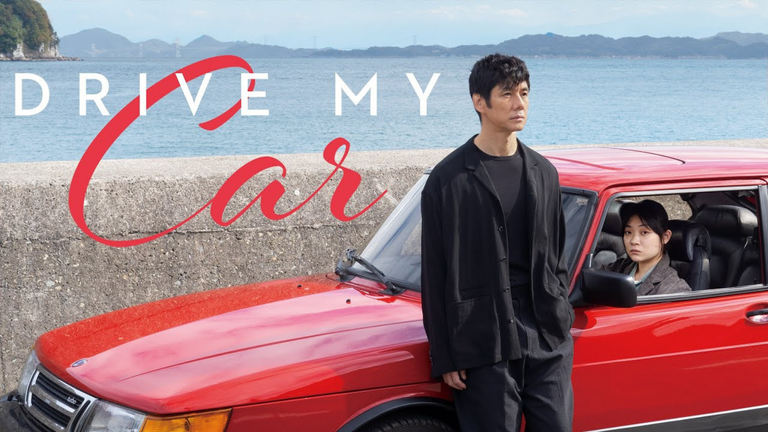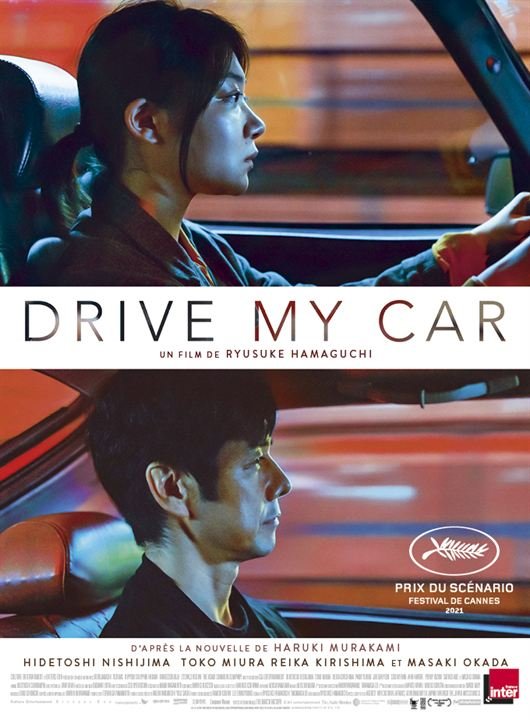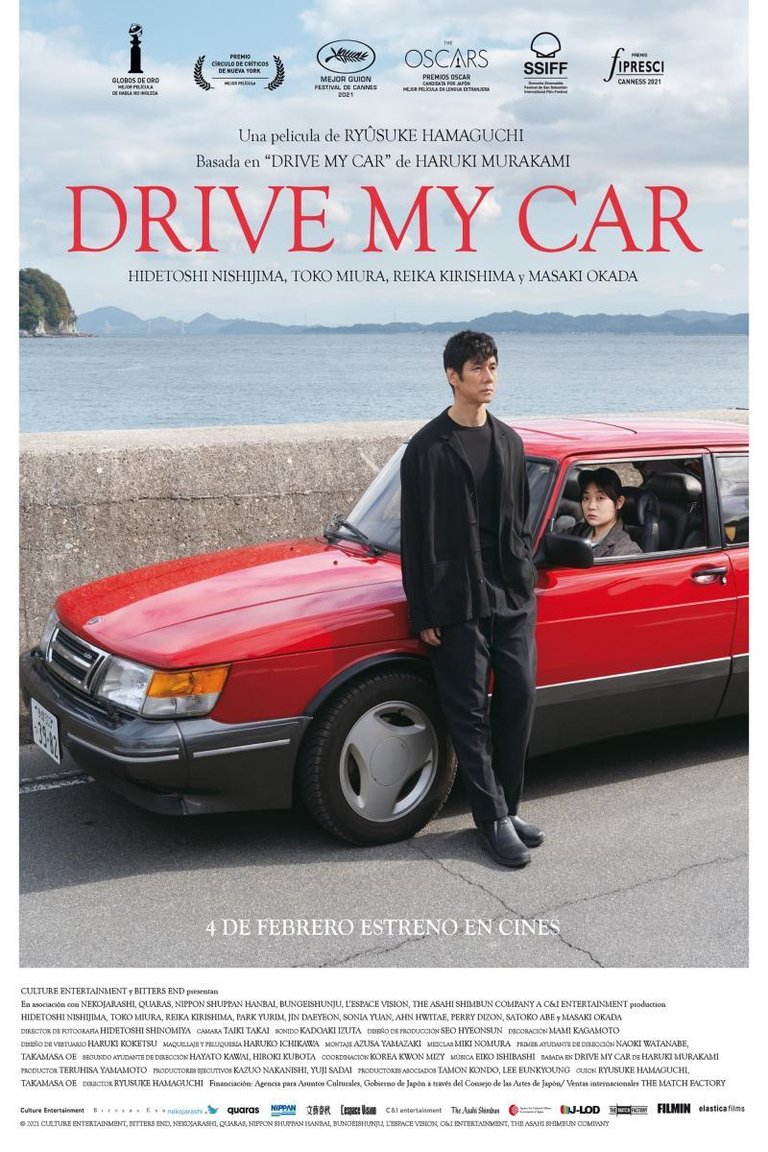Drive My Car (2021): about loneliness and grief | sobre la soledad y el duelo

Basada en un relato de Haruki Murakami
One of my favorite categories at the Academy Awards (perhaps my favorite one) is Best International Film. I like to discover stories from the most remote corners of the planet and that is why I like to see all the nominated ones, and even those that have appeared in previous editions. That's why I had this movie on my radar for a while, but it wasn't easy for me to find three free hours to watch it. Finally last night and thanks to MUBI I was able to do it.
Una de mis categorías favoritas en la entrega de los premios de la Academia (quizás la que más me gusta) es la de Mejor Película Internacional. Me gusta descubrir historias provenientes de los más remotos rincones del planeta y por eso me gusta ver todas las nominadas, e incluso las que han figurado en ediciones anteriores. Por eso mismo tenía esta película en mi radar hacía un tiempo, pero no se me hizo fácil encontrar tres horas libres para verla. Finalmente anoche y gracias a MUBI pude hacerlo.
Directed and co-written by Ryûsuke Hamaguchi (who's responsible for another film that I have on my list, but have not seen yet, called Wheel of Fortune and Fantasy) Drive My Car is a film based on a story by the same name of the famous writer Haruki Murakami, included in his book Men without Women, which I read a few years ago. Given the insufficient adaptations that summarize six hundred pages in two hours, I think viewers will be in favor of the fact that those 20 or 30 pages that Murakami wrote have made for three hours of film. It is logical that the director has changed some things and added others, but the essence of the story and the characters is Murakami in his purest form: lonely characters (even the city itself sometimes seems alone, abandoned), stories within the story, that reference in the title to a song by The Beatles (included in Rubber Soul, one of my favorite Fab Four albums), the melancholy that floats in the atmosphere and the references to Western writers, all of that is part of the Murakami's seal, so if you haven't read it, this movie can give you a good idea of how the author of 1Q84 writes. But in a nutshell, Drive My Car tells the story of Yusuke Kafuku, an actor and theater director who tries to overcome the loss of his recently deceased wife and as part of that grieving process - but also as part of his job - he agrees to stage the play Uncle Vania by Anton Chekhov in a theater festival to be held in Hiroshima.
Dirigida y co escrita por Ryûsuke Hamaguchi (es responsable de otra película que tengo en mi lista, pero aún no he visto, llamada Wheel of Fortune and Fantasy) Drive My Car es una cinta basada en un relato del mismo nombre del famoso escritor Haruki Murakami, incluido en su libro Hombres sin mujeres, el cual leí hace algunos años. Ante las adaptaciones insuficientes que resumen seiscientas páginas en dos horas, creo que los espectadores estarán a favor de que esas 20 o 30 páginas que escribió Murakami hayan dado para tres horas de película. Es lógico que el director ha cambiado algunas cosas y ha agregado otras, pero la esencia de la historia y de los personajes es Murakami en estado puro: personajes solitarios (es que hasta la propia ciudad parece a veces sola, abandonada), historias dentro de la historia, esa referencia en el título a una canción de The Beatles (incluida en Rubber Soul, uno de mis discos favoritos de los Fab Four), la melancolía que flota en la atmósfera y las referencias a escritores occidentales, todo eso es parte del sello de Murakami, así que si no lo han leído, esta película les puede dar una buena idea de cómo escribe el autor de 1Q84. Pero en pocas palabras, Drive My Car cuenta la historia de Yusuke Kafuku, un actor y director de teatro que intenta superar la pérdida de su esposa, recientemente fallecida y como parte de ese proceso de duelo - pero también como parte de su trabajo - acepta montar la obra Tío Vania de Antón Chéjov en un festival de teatro a celebrarse en Hiroshima.

Now, what does that have to do with the title? Well, the festival organizers assign Yusuke a driver (female driver in this case) to take him everywhere. Yusuke likes to drive, so it is not easy to give control of his vehicle to the young Misaki, but he has no choice and as the days, routes and experiences together go by, both characters begin to get closer and confess dark secrets of their respective pasts.
Ahora bien, ¿qué tiene que ver eso con el título? Pues que los organizadores del festival le asignan un conductor (conductora en este caso) para que lo lleve a todas partes. A Yusuke le gusta conducir, así que no es fácil ceder el control de su vehículo a la joven Misaki, pero no tiene opción y a medida que pasan los días, los recorridos y las experiencias en común, ambos personajes comienzan a acercarse y a confesarse oscuros secretos de sus respectivos pasados.
Now, by way of clarification and preparation, almost a third of the film shows the relationship between Yusuke and his wife Oto. This means that it is after almost an hour of film that she dies and (two years later) Yusuke leaves for the festival, which is when Misake appears. That would make the story seem almost like two different stories, but there are enough connections and references to make it clear why the director spent so much time showing a character who wouldn't be in most of the movie. And then, the montage of Uncle Vania is incredible because it is being done in different languages. That is, they selected actors from Japan, Korea, Thailand, among other places, but each one interprets their lines in their native language (in the staging there will be a screen with subtitles for the audience) and even one of the actresses is mute and communicates through sign language. I thought this was wonderful and I would love to see a play like this sometime. Hence, more than a story of love and heartbreak, much of the film is seen as an artistic drama, theatrical in this case, with readings, rehearsals and staging. But, above all those things, Drive My Car is a film that talks about loneliness and grief.
Ahora bien, a manera de aclaratoria y preparación, casi un tercio de la película muestra la relación entre Yusuke y su esposa Oto. Esto quiere decir que es después de casi una hora de cinta cuando ella muere y (dos años más tarde) Yusuke se marcha para el festival, que es cuando aparece Misake. Eso haría parecer la historia casi como dos historias diferentes, pero hay suficientes conexiones y referencias para que se entienda por qué el director dedicó tanto tiempo a mostrar un personaje que no estaría en la mayor parte de la película. Y luego, el montaje de Tío Vania es increíble porque se está realizando en diferentes idiomas. Es decir, seleccionaron actores provenientes de Japón, Corea, Tailandia, entre otros lugares, pero cada uno interpreta sus líneas en su idioma materno (en la puesta en escena habrá una pantalla con subtítulos para la audiencia) e incluso una de las actrices es muda y se comunica a través de lengua de señas. Esto me pareció maravilloso y me encantaría poder ver una obra así alguna vez. De allí que, más que una historia de amor y desamor, gran parte de la película se vea como un drama artístico, teatral en este caso, con lecturas, ensayos y la puesta en escena. Pero, por sobre todas esas cosas, Drive My Car es una película que habla de la soledad y el duelo.

Not only that of Yusuke, the most direct and obvious, but also that of other characters, the main one being Misaki, the young driver who gains prominence as we see her appear more and more on the screen. Yusuke and Misaki are characters surrounded by immense loneliness and immense pain that is revealed to us little by little as they confess to each other. I really liked the evolution of the relationship between the two of them and I liked that it was free of romantic connotations. Yusuke, older to the point of being able to be Misaki's father, finds in the young woman someone he trusts, who can understand the situation he is going through and she, almost always sparse in words and with a professional seriousness that borders on the stoic, opens up emotionally with this man who shares with her the weight of the past, the guilt and the pain. Drive My Car is a serene, emotional, beautifully photographed film, in which the details count for a lot and in which - as in a Chinese box dynamic - each story contains another that complements, opposes or denies it, making us stay attentive at all times despite its three hours duration, have any of you seen this movie? what did you think ? I read you in the comments.
No sólo el de Yusuke, el más directo y evidente, sino también el de otros personajes, siendo el principal de ellos el de Misaki, la joven conductora que va ganando protagonismo a medida que la vemos aparecer más y más en la pantalla. Yusuke y Misaki son personajes rodeados por una inmensa soledad y un inmenso dolor que se nos va revelando de a poco a medida que se van confesando uno con otro. Me gustó mucho la evolución de la relación entre ellos dos y me gustó que estuviera libre de connotaciones románticas. Yusuke, mayor al punto de poder ser padre de Misaki, encuentra en la joven alguien de confianza, que puede entender la situación que él atraviesa y ella, parca en palabras casi siempre y con una seriedad profesional que raya en lo estoico se abre emocionalmente con este hombre que comparte con ella el peso del pasado, la culpa y el dolor. Drive My Car es una película serena, emotiva, bellamente fotografiada, en la que los detalles cuentan mucho y en el que - como en una dinámica de cajas chinas - cada historia contiene otra que la complementa, la opone o la desdice, haciendo que nos mantengamos atentos en todo momento a pesar de sus tres horas de duración, ¿alguno de ustedes ha visto esta película? ¿qué les pareció ? Los leo en los comentarios.
Reviewed by | Reseñado por @cristiancaicedo
Other posts that may interest you | Otros posts que pueden interesarte:
 |
|---|



Desde hace ratooo la tengo en la lista. Creo que ya es momento de verla
Creo lo mismo, es una muy buena película
Ya van tres peliculas que conozco que son de conductores solitarios, wow. Esta se ve interesante y ciertamente original, me ha sonado en varias partes el titulo de ese film pero no sabia de que trataba, me ha servido tu opinion para tenerla en cuenta. Saludos.
Se me ocurre que la otra puede ser Drive con Ryan Gosling, pero ¿cuál sería la tercera?